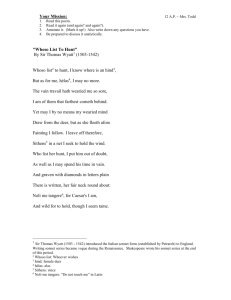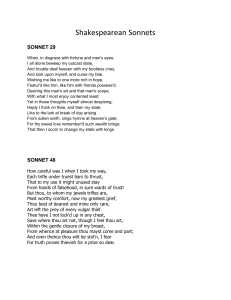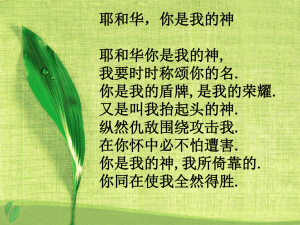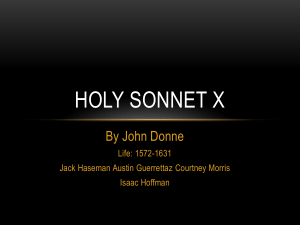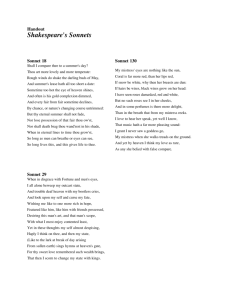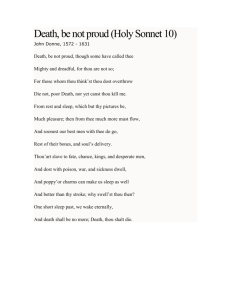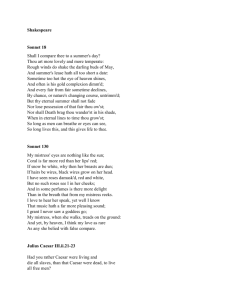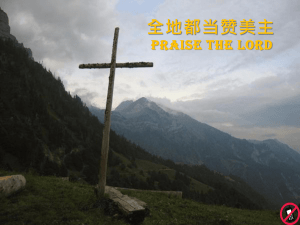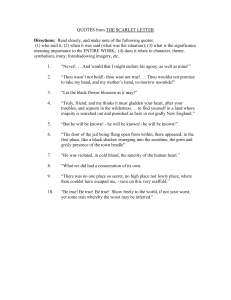Sonnet - mslinkrhsenglish
advertisement
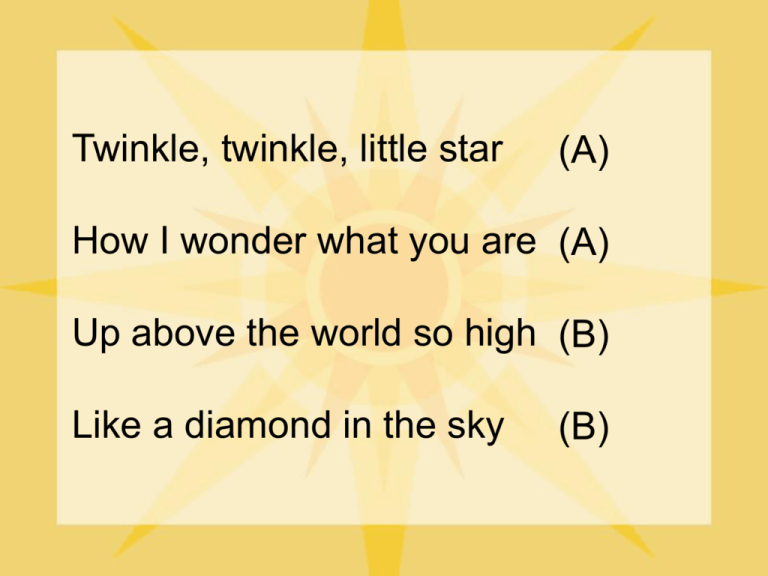
Twinkle, twinkle, little star
(A)
How I wonder what you are (A)
Up above the world so high (B)
Like a diamond in the sky
(B)
Scanning should always be done on the right
side of the poem, never on the left (scan on the
side where the rhyme is.
You’re looking at the end rhyme only (last
word in line)
For every new rhyme, use a new capital letter
Letters should be in ( )’s, so they don’t look
like a spelling error at the end of the line
The Petrarchan
Sonnet
On First Looking Into
Chapman’s Homer
John Keats
Much have I travell'd in the realms of gold, (A)
And many goodly states and kingdoms seen; (B)
Round many western islands have I been ; (B)
Which bards in fealty to Apollo hold. (A)
Oft of one wide expanse had I been told ; (A)
That deep-brow'd Homer ruled as his demesne: (B)
Yet did I never breathe its pure serene (B)
Till I heard Chapman speak out loud and bold: (A)
Then felt I like some watcher of the skies (C)
When a new planet swims into his ken; (D)
Or like stout Cortez, when with eagle eyes (C)
He stared at the Pacific--and all his men (D)
Look'd at each other with a wild surmise-- (C)
Silent, upon a peak in Darien. (D)
Whoso List to Hunt
Sir Thomas Wyatt The Elder
Whoso list to hunt, I know where is an hind,
But as for me, alas, I may no more.
The vain travail hath wearied me so sore
I am of them that farthest cometh behind.
Yet may I, by no means, my wearied mind
Draw from the dear, but as she fleeth afore,
Fainting I follow. I leave off therefore,
Since in an net I seek to hold the wind.
Who list her hunt, I put him out of doubt,
as well as I , may spend his time in vain.
And graven with diamonds in letters plain
There is written, her fair neck round about.
“noli me tangere, for Caesar’s I am,
And wild for to hold, though I seem tame.”
Noli me tangere quia Caesaris sum =
”Touch me not, for I am Caesar’s” was
inscribed on the collars of Caesar’s
hinds which were then set free and were
presumably safe from hunters. Wyatt’s
sonnet is usually supposed to refer to
Anne Boleyn, in whom Henry VIII
became interested in 1526.
Whoso list to hunt, I know where is an hind,(A)
But as for me, alas, I may no more. (B)
The vain travail hath wearied me so sore (B)
I am of them that farthest cometh behind. (A)
Yet may I, by no means, my wearied mind (A)
Draw from the dear, but as she fleeth afore,(B)
Fainting I follow. I leave off therefore,(B)
Since in an net I seek to hold the wind.(A)
Who list her hunt, I put him out of doubt,( C)
as well as I , may spend his time in vain.(D)
And graven with diamonds in letters plain (D)
There is written, her fair neck round about.(C )
“noli me tangere, for Caesar’s I am,(E)
And wild for to hold, though I seem tame.”(E)
Holy Sonnet 10
John Donne
Death be not proud, though some have called thee
Mighty and dreadful, for thou art not so;
For those whom thou think’st thou dost overthrow
Die not, poor Death, nor yet canst thou kill me
From rest and sleep, which but thy pictures be,
Much pleasure; then from thee much more must flow,
And soonest our best men with thee do go,
Rest of their bones, and soul’s delivery.
Thou art slave to fate, chance, kings and desperate men,
And dost with poison, war, and sickness dwell,
And poppy or charms can make us sleep as well
And better than thy stroke; why swell’st thou then?
One short sleep past, we wake eternally
And death shall be no more; Death, thou shalt die.
Holy Sonnet 10
Death be not proud, though some have called thee(A)
(Mighty and dreadful, for thou art not so; (B)
For those whom thou think’st thou dost overthrow(B)
Die not, poor Death, nor yet canst thou kill me (A)
From rest and sleep, which but thy pictures be,(A)
Much pleasure; then from thee much more must flow,(B)
And soonest our best men with thee do go, (B)
Rest of their bones, and soul’s delivery (A )
Thou art slave to fate, chance, kings and desperate men,(C )
And dost with poison, war, and sickness dwell,(D)
And poppy or charms can make us sleep as well(D)
And better than thy stroke; why swell’st thou then?(C)
One short sleep past, we wake eternally (A)
And death shall be no more; Death, thou shalt die.(E)
Assignment:
Write either a Shakespearean
or Petrarchan Sonnet {see your
list of poetry lingo for definitions
of each.}
Popular themes included: love, death
and time but could be about virtually
anything.
Always 14 lines
Arranged in a very particular structure
(see definitions)
Your sonnet must be scanned on the
right hand side before it is turned in.
The outline of your poem should look
like this
:c
Requirements:
Must be labeled at top under your name as
either Shakespearean {English} or
Petrarchan{Italian}
Must meet all the chosen form’s requirements
Tone and subject are completely up to you.
A helpful hint: The Shakespearean form is
easier, if you like a challenge give the Petrarchan
a try.
Due Thursday
Please Note: This is the first
poetry assignment on which
you can lose points. Please
follow the guidelines carefully.
